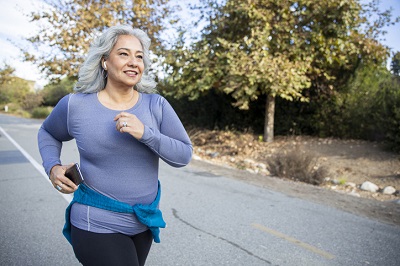Anti-aging medical care, once out of reach for middle-class Americans, is now more affordable and accessible than ever. Many different aspects make up the broad discipline of anti-aging medicine, but hormone balancing is among the most important components of any successful anti-aging strategy. Let’s explore how aging affects the mind and body, the role of hormones in the aging process, and how hormone replacement therapy (HRT) can produce anti-aging results for the patients who receive it.
How Does Aging Affect the Mind and Body?
 Before we begin to unpack proven anti-aging strategies, it’s first important to understand how aging affects the mind and body.
Before we begin to unpack proven anti-aging strategies, it’s first important to understand how aging affects the mind and body.
- Skin changes. As we move through the years, our skin tends to lose its elasticity. Fatty tissues that cluster beneath the surface of the skin disappear, contributing to the “hollowing” of cheeks and other undesirable changes to appearance that result. The skin produces less natural oil and, as a result, becomes drier. Many factors contribute to age-related skin changes, including reduced collagen levels.
- Muscle loss. Age-related muscle loss is called sarcopenia. On average, we lose about 3% of our muscle mass each year after we turn 50. Initially, this muscle loss might only be noticeable during exercise in terms of how it affects athletic performance. Over time, though, age-related muscle loss can make daily living a challenge.
- Bone density loss. Like muscle, aging also impacts bone health. The medical condition known as osteoporosis refers to a progressive loss of bone density that begins at an advanced age. Declining levels of HGH in older individuals contribute significantly to both bone and muscle loss over time.
- Deteriorating joint health. Seniors have the highest risk of developing joint disorders of any age group. This is due to a number of factors, but the loss of collagen (mentioned above which also increases the appearance of wrinkles and other signs of aging skin) is a major factor in deteriorating joint health.
- Compromised mental health/cognitive function. Aging affects the brain in important ways that have implications for cognitive function, including memory, decision-making, the ability to maintain concentration, and information processing. Over time, especially without anti-aging interventions, the risk of neurodegenerative illnesses like Parkinson’s disease, Alzheimer’s disease, and others increases significantly.
- Increased risk of heart disease. Heart disease, also called cardiovascular disease, refers to any condition that impairs the ability of the heart to efficiently deliver oxygenated, nutrient-rich blood to the tissues and organs in the body. Examples of heart conditions that typically worsen with age include stiffening veins and arteries (atherosclerosis) and abnormal heart rhythm (arrhythmia). Over time, age-related changes increase the likelihood of a potentially fatal cardiovascular emergency like heart attack or stroke.
- Loss of sexual function/desire. The age-related hormonal changes that occur over time significantly impact sexual function. For women, these changes are most dramatic during menopause (usually beginning between ages 45-55). For men, this means steadily declining testosterone levels over time and a slow loss of libido.
- Impaired metabolism. A healthy metabolism – simply defined as the body’s processing, storage, and use of energy – is critical for keeping off unwanted body fat and maintaining high energy levels to stay as active as you want to be into your golden years. Unfortunately, your body’s ability to efficiently use the energy that you take in through diet declines over time, eventually resulting in diabetes and other metabolic disorders.
What Role Do Hormones Play in the Aging Process?
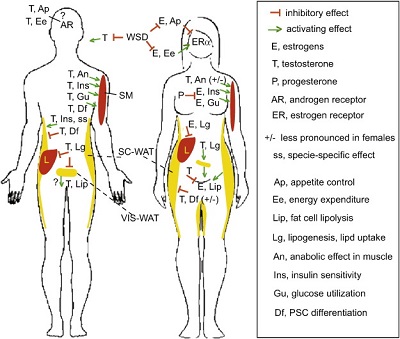 The human endocrine system (hormone system) is a network of glands and organs that produce and distribute chemical messengers (hormones) that communicate with various organs to regulate their function. Hormones contribute to the process of homeostasis – the management of normal, healthy conditions in the body. The levels of the 50 various hormones endogenous to the human body – both their raw concentrations in the blood as well as their relative levels compared to one another – have important implications for age.
The human endocrine system (hormone system) is a network of glands and organs that produce and distribute chemical messengers (hormones) that communicate with various organs to regulate their function. Hormones contribute to the process of homeostasis – the management of normal, healthy conditions in the body. The levels of the 50 various hormones endogenous to the human body – both their raw concentrations in the blood as well as their relative levels compared to one another – have important implications for age.
Testosterone and Aging in Men
On average, a man loses 1% of his total testosterone each year after it peaks in late adolescence or early adulthood. Declining testosterone levels are a major health issue in aging men because, as the graphic below illustrates, testosterone receptors are found in nearly every major organ and gland in the body where the hormone exerts beneficial health effects. When men experience a loss of testosterone below acceptable limits, he is diagnosed with a condition called testosterone deficiency, or, as it is more commonly called in everyday language, “low T.” The symptoms of testosterone deficiency, or “low T,” include:
- Loss of muscle mass (sarcopenia)
- Decreased bone density (osteoporosis)
- Lack of interest in sex (low libido)
- Inability to achieve or maintain an erection
- Lowered sperm quality.
- Limited energy (chronic fatigue)
- Lack of motivation
- Emerging mental health issues such as depression and anxiety
As you will notice, many of the symptoms of testosterone deficiency coincide with those seen in aging men. This is because falling testosterone levels contribute to the effects of aging. If you are an aging man with any of the symptoms above, you might have a testosterone deficiency. Therapy and lifestyle adjustments can elevate testosterone counts and reduce or eliminate these symptoms (see the final section for more information on testosterone therapy).
Estrogen, Menopause, and Aging in Women
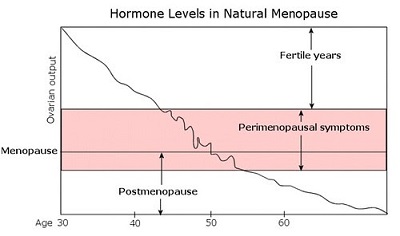 While keeping testosterone levels elevated is critical for healthy aging in men, estrogen (the main female sex hormone) is equally important for women. For most women, the effects of falling estrogen levels become apparent during menopause, a natural process during which the ovaries stop releasing eggs and the menstrual cycle stops. It’s important to note that, although menopause does not usually begin until a woman is in her 40s, the effects of falling estrogen levels can begin to significantly impact a woman’s life as early as her late 20s. These include:
While keeping testosterone levels elevated is critical for healthy aging in men, estrogen (the main female sex hormone) is equally important for women. For most women, the effects of falling estrogen levels become apparent during menopause, a natural process during which the ovaries stop releasing eggs and the menstrual cycle stops. It’s important to note that, although menopause does not usually begin until a woman is in her 40s, the effects of falling estrogen levels can begin to significantly impact a woman’s life as early as her late 20s. These include:
- Hot flashes.
- Night sweats.
- Vaginal dryness.
- Loss of interest in sex (low libido).
- Unwanted weight gain.
- Insomnia.
- New or worsening depression and other mental health conditions.
The Role of HGH in Healthy Aging
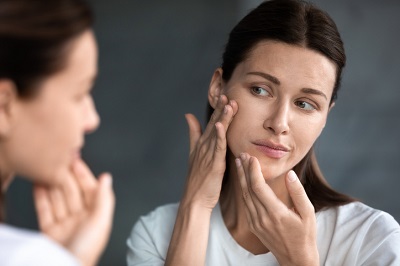 Next to testosterone for men and estrogen for women, HGH plays an enormous role in healthy aging. As a pro-growth anabolic hormone, HGH is responsible for managing metabolism, directing tissue repair following injury or intense exercise, keeping brain cells healthy and functional, and fostering the development of healthy bones and muscles. Unfortunately, as with other hormone levels, the amount of HGH that the pituitary gland produces can decline across the lifespan, causing many aging Americans to be diagnosed with growth hormone deficiency (GHD).
Next to testosterone for men and estrogen for women, HGH plays an enormous role in healthy aging. As a pro-growth anabolic hormone, HGH is responsible for managing metabolism, directing tissue repair following injury or intense exercise, keeping brain cells healthy and functional, and fostering the development of healthy bones and muscles. Unfortunately, as with other hormone levels, the amount of HGH that the pituitary gland produces can decline across the lifespan, causing many aging Americans to be diagnosed with growth hormone deficiency (GHD).
Here is how low HGH levels affect the mind, body and emotions:
- Physical effects of low HGH: Muscle loss, bone loss, decreased sexual function/interest in sex, sagging or dry skin, accumulation of body fat (especially visceral fat or “belly fat” around the abdomen), reduced cardiovascular endurance, chronic fatigue.
- Mental effects of low HGH: Difficulty concentrating, cognitive (information processing) difficulties, higher risk of depression and anxiety, poor memory.
- Emotional effects of low HGH: Mood swings, feelings of hopelessness, irritability, social isolation and loneliness.
The age-related decline in HGH can have a truly devastating impact on your life. The good news is that you can reverse the negative physical, mental, and emotional changes caused by low HGH with HGH replacement therapy.
HGH Therapy: An Ideal Anti-Aging Treatment?
Your HGH levels, depending on age and sex, should fall into the normal ranges below for optimal health:
| Normal HGH Levels | ||
| Adult Men | Adult Women | Children |
| 0.4-10 ng/mL | 1-14 ng/mL | 10 to 50 ng/mL |
If a patient’s HGH levels fall below the thresholds defined above, your doctor will diagnose you with a condition called hypopituitarism, meaning that your pituitary gland does not produce enough HGH to meet your needs. Hormone replacement therapy (HRT) refers to the medical practice of carefully supplementing hormone levels (in this case, HGH) with a synthetic pharmaceutical version of HGH called somatropin.
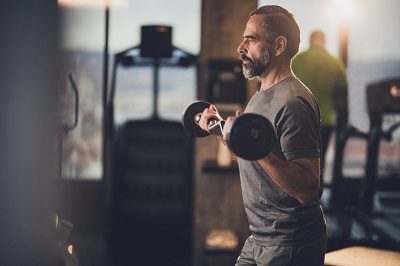
HGH replacement therapy with somatropin is an FDA-approved treatment for growth hormone deficiency. It is a safe, thoroughly tested mode of hormonal healthcare that produces the following benefits:
- Improved cardiovascular capacity (endurance)
- Greater lean muscle mass
- Reduced body fat, especially around the belly
- Increased bone density
- Renewed interest in sex
- Greater energy levels
- More youthful, vibrant physical appearance
Look Younger: HGH Reduces Wrinkles and Improves Skin and Hair Quality
As a patient looking to optimize your health, you don’t just want to feel younger and more energetic – you want to look younger and healthier as well. HGH improves physical appearance through several mechanisms, including healthier cell recycling, increased collagen production, and faster tissue repair. The appearance-enhancing benefits of HGH therapy include:
- Fuller, thicker, sleeker hair.
- Strong, healthy nails.
- Younger-looking, more supple skin.
Testimonials: HGH Therapy Delivers Results for Real Patients

Thousands of Americans receive HGH replacement therapy each year with successful anti-aging outcomes. Here are a few testimonials regarding the biggest impacts that higher HGH levels have had on the patients who receive therapy.
“I have lost those extra pounds, have plenty of energy (both day and night) for everything I want to do. Yes, that includes the best sex I have had in years. Thanks for helping me get my life back on track.”
-Ben, 58
“ Not only did my joint pains begin to subside, but I also felt stronger and healthier.”
-Harold, 71
“My skin has regained its elasticity, my hair is strong and healthy again, and my nails (which I’ve always had issues with) are thicker and stronger than ever.”
-Jenna, 52
Beyond HGH: Other Hormone Therapies That Provide Anti-Aging Benefits
So, we’ve covered the anti-aging benefits of HGH. What about the other more than 50 hormones in the human body? How can you optimize levels of other critical hormones as part of your anti-aging care?
Here are the other hormonal therapies that you can use to feel and look younger:
- Testosterone replacement therapy (TRT) (for men).
- Estrogen replacement therapy (ERT) (for women).
- Melatonin supplementation. Melatonin, an important neurotransmitter in the brain, acts as an anti-aging antioxidant while regulating your circadian rhythm for restful, restorative sleep.
Talk to your doctor to discover how you can incorporate these anti-aging hormone treatments into your own healthcare plan. With the proper supplementation strategies, combined with everyday health-building practices such as regular exercise and a healthy diet, you can look and feel decades younger than the age on your driver’s license.

